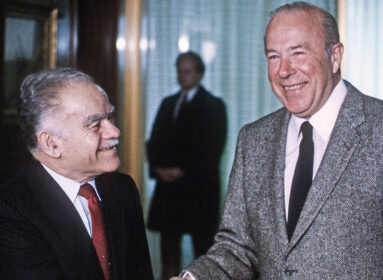By Cindy Mindell
 SOUTHBURY – With the December sentencing of former board president, Jodi Churchill, Beth El Synagogue in Southbury closes the door on a three-year investigation that revealed the misappropriation of more than $600,000 in stolen funds.
SOUTHBURY – With the December sentencing of former board president, Jodi Churchill, Beth El Synagogue in Southbury closes the door on a three-year investigation that revealed the misappropriation of more than $600,000 in stolen funds.
It’s a significant milestone for this 90-year-old Conservative congregation, founded in Waterbury in 1924 by a group of members who broke off from the Modern Orthodox Hebrew Congregation. But it’s also the common story, in a time of attrition, mergers, and closings, of a struggling Jewish organization grasping the hand willing to help out in tough times.
Beth El was the first Byzantine-style synagogue in the state when it opened its new building on Cooke Street in Waterbury in 1951. A half-century later, the congregation sold the structure to the Torah Umesorah yeshiva community. With less than 100 members, Beth El moved to rented space on the Walzer Family Jewish Community Campus in Southbury.
In May, Churchill admitted to embezzling more than $661,000 in Beth El assets.
According to court documents and statements made in the Hartford court, Churchill began the illegal activity in November 2010, while serving as Beth El’s vice president. In June 2011, she became board president and used her new position to open a checking account and a money market account in the name of the synagogue. Initially, Churchill opened the accounts using the synagogue’s Southbury business address, later directing the bank to change the mailing address on the accounts to her residence in Orange, where all bank statements were mailed. Churchill was the only signatory on the accounts. This was all unbeknownst to Beth El.
Between June and December 2011, Churchill deposited bank checks totaling more than $300,000 in Beth El assets to the accounts.
“We told the judge at the sentencing hearing that Jodi rode in on a white horse and said that she could save the synagogue,” says Susan Sieber, who took over as Beth El president in 2012. “Jodi had not been a member for very long – maybe a year – before she became vice president and then president. She was younger and was interested in taking a leadership role and we believed she had the best interests of the synagogue in mind.”
The investigation, led by the United States Secret Service and prosecuted by Assistant United States Attorney Christopher W. Schmeisser, revealed that Churchill made more than 60 unauthorized ATM and over-the-counter withdrawals of synagogue funds in amounts ranging from $200 to $5,000. She used embezzled funds to pay school-related expenses for her son and daughter, expenses for leasing a horse used by one of her children, vehicle expenses, airline tickets, and hotel expenses for personal travel. She also provided stolen funds to her mother, who held the office of Beth El’s treasurer.
In December, Churchill was sentenced to 30 months in prison, followed by three years of supervised release. She was also ordered to serve six months of home confinement and perform 120 hours of community service while on supervised release.
After the embezzlement scheme was uncovered, the government seized approximately $104,000 from Churchill’s bank accounts, and seized and sold, for approximately $22,000, a truck she had purchased with synagogue funds. The funds have been returned to the synagogue. Churchill was ordered to pay restitution in the amount of $531,985.25 to the synagogue and its insurer.
“Jodi said that she was reinvesting the funds in CDs,” Sieber says. “She drafted the paperwork to open an account at another bank and spent the money down with a debit card. She prepared and presented fraudulent reports to the board. She hid all that from us. Should we have asked more questions? Yes. Should we have done background checks on all signers? Yes. We will certainly continue to do this in the future.”
Rabbi Eliana Falk and Beth El Vice President David Isaacs were the first to be informed of the scheme by a Secret Service agent who was part of the Department of Homeland Security. This agency became involved because banks must report activity involving transfers of more than $10,000.
Isaacs immediately removed Churchill as signatory on the synagogue accounts and replaced her with other trusted board members. “Our internal policy requires two signers on a check, but the banks will cash checks with just one signature,” Sieber explains, which was what allowed Churchill to withdraw money from the synagogue accounts.
Following Secret Service instructions, Isaacs only informed a limited number of board members of the situation, including Sieber, and asked her to take over as president. Sieber was already involved in Dressage4Kids in Southbury and president of Little Britches Therapeutic Riding, a 501(c)3 operating in Woodbury, Roxbury, and Litchfield.
“At the time, there were just a few of us who knew about the situation,” she says. “I agreed to become president because I thought I could help out.” The new board treasurer is a longtime board member and has a bookkeeping background, Sieber says.
“Once we learned of this terrible crime, our leadership took on the task of working with the federal agents, the banks, and the insurance company with grace and dedication that could only be described as awe-inspiring,” says Falk. “Neither their efforts nor commitment wavered from the moment they were informed until the final sentencing. We will be ever grateful to the federal agents who labored so diligently to ensure that justice was done.”
“Because of their efforts, and those of our board and outstanding members, we have emerged not only whole, but stronger, with renewed energy to be an inspiring place of worship, learning and community,” she adds.
Beth El has retrieved most of the stolen funds, Sieber says, save for some $20,000. Once released from prison, Churchill is to pay the synagogue $250 a month until she makes up the full amount.
Despite this setback, Beth El is still healthy and, in fact, expanding. The synagogue is looking for a larger space to accommodate its congregation, which has grown by 17 families this year.
“We never lost faith in our congregation or our mission and board members offered support and guidance as the team navigated this difficult situation. We are grateful to Rabbi Falk for being a strong spiritual guide and support,” says Seiber.
Her advice to other synagogues: “I would encourage all synagogues to look carefully at their insurance policies to be sure they are covered for criminal activity. Without the foresight of our board, we would not have recovered from the effects of this crime.”
Comments? email cindym@jewishledger.com.








 Southern New England Jewish Ledger
Southern New England Jewish Ledger










